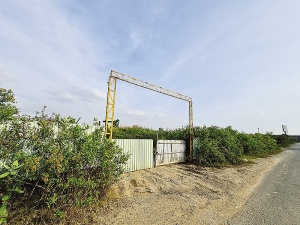Real estate status puts paid to investment sharing apps
Cengroup stormed the real estate market a few years ago with the announcement of the Revex joint investment technology platform to offer investment packages started from only $40. The website for the platform has no longer existed since the beginning of this year, along with the disappearance of investors.
 |
| Technology is making it easier to invest in real estate, photo Le Toan |
Talking to VIR, a representative from Revex explained that the company had shut down the app, but insisted the company would try again when the real estate market was in a stronger position.
In apps like these, individual investors can take part in property investment with only a few million VND in million-dollar real estate products with an attractive annual profit commitment from the investor.
In 2019, SK Finance, an arm of Sunshine Group, implemented a model of joint purchase of real estate products of Sunshine Homes. With packages also starting from around $40, investors could take part in real estate projects with a committed return of 11 per cent per year. However, the function for purchasing real estate in shares was terminated late last year due to the real estate market downturn.
In the southern region, Moonka implemented a joint purchase on the basis of encryption technology in 2021, applying blockchain technology to encode real estate into digital assets. Each real estate on the Moonka platform is divided into hundreds or thousands of shares or more, depending on their value. Investors can buy one or more shares to jointly own and share profits.
With offering to tokenise investment in three real estate projects in Can Gio district in Ho Chi Minh City, and Bao Loc and Bao Lam districts in the Central Highlands province of Lam Dong in six months, Moonka expects to pay profit of 15-18 per cent to its shareholders. However, very few investors have participated so far.
According to real estate investment consultant Tran Minh, these joint buying applications are called real estate investments, but they are not actually assets because customers do not own the real estate.
“In reality, this is a form of capital mobilisation. They consider real estate assets as a financial investment channel to attract cash flow from the market besides other capital mobilisation channels such as banks, stocks, bonds or capital contribution contracts with customers,” Minh said.
Due to the low initial investment capital, different from other forms of real estate investment aimed at customers with strong financial capacity, this real estate joint purchase channel expands the audience to small investors and traders who have little capital and not enough to invest in any other channels. “These may even be people living in the countryside, or students who have not had much experience in participating in the market,” said Minh.
“The benefit of this capital mobilisation channel is that investors will get capital flows in the current difficult market context, opening up capital flows for the real estate market. However, for investors, this is a new type of investment with no real experience in the market,” added Minh.
In Vietnam, the legal framework for these types of operations is still unclear, meaning a high risk of financial incidents. Therefore, according to Minh, when there is a dispute between the customer and the business, the customer’s interests will not be protected by law.
On the other hand, the profit commitment of app owners is only based on civil contracts the owners may pay or not. The law does not currently have specific provisions on the issue.
 | Real estate businesses yet to recover The number of newly established real estate businesses and their capital continued to drop sharply in the first half of the year, equal to less than half of the same period last year. |
 | 62 real estate projects in Ho Chi Minh City fail housing standards In Ho Chi Minh City, 62 real estate developments have been reportedly flagged by the Department of Planning and Investment (DPI) for failing to meet the criteria set for commercial housing projects. The revelation has triggered investor anxiety, particularly among those who have already staked significant financial resources in these projects. Some of the developments have been occupied for years, despite not satisfying requisite standards. |
 | Real estate tokenisation risks must be accounted for While real estate tokenisation offers advantages, it also presents potential risks. De-tokenisation is an important concept which affects the ability of the token to hold its value. It is the litmus test for token holders to validate the legal structure by exercising their rights to redeem the underlying title deed anytime. |
What the stars mean:
★ Poor ★ ★ Promising ★★★ Good ★★★★ Very good ★★★★★ Exceptional
Related Contents
Latest News
More News
- Real estate investment trusts pivotal for long-term success (February 02, 2026 | 11:09)
- Dong Nai experiences shifting expectations and new industrial cycle (January 28, 2026 | 09:00)
- An Phat 5 Industrial Park targets ESG-driven investors in Hai Phong (January 26, 2026 | 08:30)
- Decree opens incentives for green urban development (January 24, 2026 | 11:18)
- Public investment is reshaping real estate’s role in Vietnam (January 21, 2026 | 10:04)
- Ho Chi Minh City seeks investor to revive Binh Quoi–Thanh Da project (January 19, 2026 | 11:58)
- Sun Group launches construction of Rach Chiec sports complex (January 16, 2026 | 16:17)
- CEO Group breaks ground on first industrial park in Haiphong Free Trade Zone (January 15, 2026 | 15:47)
- BRIGHTPARK Entertainment Complex opens in Ninh Binh (January 12, 2026 | 14:27)
- Ho Chi Minh City's industrial parks top $5.3 billion investment in 2025 (January 06, 2026 | 08:38)

 Tag:
Tag:



















 Mobile Version
Mobile Version